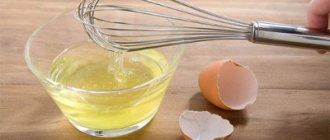The shelf life of eggs in various conditions is of concern to many, because this is one of the ingredients present in the daily diet. When purchasing, you should pay attention not only to the category, but also to the condition of the shell.
There should be no droppings, cracks, or other defects; this negatively affects the suitability. Only small spots or stripes obtained during transportation are acceptable.
Chicken diet eggs can be stored without refrigeration for no more than seven days; canteens up to 25 days; washed - no more than 12 days. In the refrigerator, the shelf life is also different: the quality of chicken eggs decreases faster due to the thin shell, and the eggs dry out faster, so they can be stored for about 90 days.
Shelf life of eggs
Chicken
How long you can store eggs in the refrigerator depends on their type and freshness. Those that are collected at the factory have a clear criterion for counting the expiration date - the date on the shell. For factory eggs, the shelf life is 1 month, for homemade eggs – 3 months.
Chicken eggs are also divided into dietary and table. The former must be eaten within a week after production, the latter are allowed to be sold within 25 days. Fresh eggs are stored longer in a brown shell, as it is thicker than white.
If all storage rules are followed in the supermarket, the shelf life of eggs can reach 30 days. The shelf life is affected by the type in which the purchased product is located.
See the table below for more details:
| Type of chicken egg | Approximate shelf life (in days) |
| raw | 28-30 |
| hard-boiled | 10-14 |
| soft-boiled | 2 |
| peeled boiled | 3 |
| cracked boiled | 3 |
| raw broken | 2 |
| Easter, if it was painted with natural dyes | 15 |
| chemically painted | 2-3 |
| sealed in thermal film | 4 |
It is equally important to remember about humidity; it should not exceed 85%, otherwise the product will quickly deteriorate and is not suitable for long-term storage.
After cooking, pay attention to the color of the white; if it is gray or bluish, then it is better to throw away the egg - it is spoiled. In any case, boiled chicken eggs cannot be stored for more than two weeks (this is the shelf life in the refrigerator).
Another way to check freshness is to put it in water. If it floats to the surface, it means that air has accumulated under the shell and the egg is clearly stale.
Quail
Quail eggs, like other birds, have their own unique properties that need to be taken into account:
- their shell is more durable, so when damaged it wrinkles rather than cracking and splitting;
- at the same time, it is thinner, so the shelf life is much shorter than chicken;
- the contents do not fade over time, but dry out until they almost completely disappear;
- Quail eggs contain the enzyme lysozyme, which prevents the formation of bacteria.
As a result, they can be kept uncooked in the refrigerator for up to two months, boiled for only 5 days, fresh without a refrigerator for 30 days, and cooked for only a day.
Many people forget about this and leave cooked foods on the table for several days, but this can cause illness.
Goose and duck
Fresh geese and duck eggs are stored at a temperature of 2 to 12°C for no longer than two weeks; before laying, they must be thoroughly washed with soda or soapy water.
This feature is explained by the fact that their shells are more porous than chicken shells, so microbes penetrate much more easily. Of course, washing will shorten the shelf life, but it guarantees safety from dangerous diseases.
Turkey
Turkey eggs are quite rare on the market; their characteristics are close to chicken eggs; under the right conditions, they will not spoil even after a month or a month and a half.
Ostrich
Of all the known foods of this type that are consumed as food, ostrich ones are considered to be the longest-lasting; even after three months they will be quite suitable for food.
All about storing raw eggs
If you rely on regulatory documents, the storage of eggs is strictly regulated. Raw chicken product has recommended maximum terms at temperatures from 0 to 20 degrees Celsius:
- Dietary – up to a week.
- Canteens – up to 25 days.
- Washed – 12 days.
Confirmed - if stored properly, good chicken is edible after several months of storage. People who run households and raise laying hens know that in winter, chickens lay eggs much worse, so it is recommended to stock up on a healthy product for future use. The basic rule for long-term storage is dirty shells.
Before sending it for long-term storage, it is necessary to wipe the surface with a cloth, but it is strictly forbidden to subject it to wet treatment. Washing helps remove the natural protective layer. Rinse heavily soiled items under running water before cooking or eating.
If you doubt the freshness of the product, this can be easily confirmed or refuted at home. Fill a deep bowl with water and lower it - what is edible will immediately sink to the bottom, and what is not fresh will float or slowly sink. When the product spoils, the air pocket fills with gas, which leads to floating.
How to store it correctly?
Before storing fresh eggs, experts advise checking whether they are spoiled, because store and factory stamps, unfortunately, cannot always be trusted. There are several simple ways to check:
You will need a little warm water, regular table salt and one fresh chicken egg.
Prepare a saline solution and put it in there:
- lies on the bottom - the egg is fresh, produced less than a week ago;
- floated up with the blunt end up - older than a week;
- floats in the prepared solution - older than two weeks;
- if it surfaces , it is spoiled and cannot be eaten unless you want to risk your health.
You won’t be walking around with a salty solution in the store, so you can just shake the egg next to your ear. If no sounds are heard, then the product is fresh.
This is, of course, not a 100% guarantee of suitability, but together with other methods (check the markings on the shell, evaluate the storage conditions in the store) it may work.
The appearance, especially in closed boxes, is definitely worth evaluating; sometimes there are cracked or even cracked eggs. Most often they try to sell such a defect at a small discount. But it’s better not to take risks and buy products that are a little more expensive, but of better quality.
In a refrigerator
The duration of storage is affected by compliance with a few simple rules. By following them, you can increase the preservation several times, without losing taste.
The product can be used in the same way as fresh: for omelettes, various salads, meringues, cakes and other baked goods.
Rules:
- Do not place on the side door of the refrigerator. Despite the fact that many models are equipped with specialized compartments on the side. Due to temperature fluctuations when opening and closing the door, the shelf life of food is reduced. The ideal place is a Chilledroom chamber designed for vegetables and fruits.
- 2-4°C is the best storage temperature for fresh eggs ; raw eggs can remain intact for up to one and a half months.
- before putting them in the refrigerator ; this will shorten the shelf life of the eggs.
- Choose containers or stands with divisions (they usually come with the refrigerator and are located on the side door).
Eggs will be better preserved in a secure position in the refrigerator. They need to be laid with the sharp end down (1 piece per 1 cell).
The container should be made of plastic with a lid that closes tightly, this will eliminate exposure to other strong odors, such as onions, smoked meats and citrus fruits.
Eggs very quickly absorb foreign odors and this affects their taste and the taste of the products prepared from them, this is especially noticeable in omelettes. In general, it is recommended to use only fresh eggs.
Which end to store?
To preserve the freshness of eggs for a longer period of time, you need to place them in a container with the sharp end down, then the yolk mass will be located in the center.
At the blunt end, the shell contains more pores through which oxygen enters and carbon dioxide escapes, and there may also be bacteria. If you place the product with the blunt end down, the germs will rise to the top and can infect the egg from the inside.
Some housewives prefer to store fresh eggs on their side and turn them over periodically, so that the yolk will not stick to the wall and will not be damaged when the shell is broken before cooking.
This is very important for those who need to separate the white from the yolk before cooking or for those who like fried eggs with a solid, slightly runny yolk.
To understand which method is right for you, try leaving one egg sideways in the refrigerator, the other with the sharp tip down. After a week or two, compare the results.
To make the experiment “clean”, use products of the same category, or better yet, purchased at the same time from the same tray.
What you need to know before use
Everyone knows that eggs are not a long-lasting product and that without refrigeration they quickly deteriorate. However, there are many little-known factors that can influence changes in the taste of a laying hen's gift even in the refrigerator. Most housewives do not even suspect that the product, although not alive, can nevertheless breathe.
The shell appears impenetrable, but in fact it contains several thousand microscopic pores. But each has a protective layer that allows only air to enter and traps microorganisms that can spoil the fresh product. This does not depend on the color of the shell.
The color of the outer shell depends only on the breed of chickens. But the truth is that brown eggs have thicker shells. Due to their thickness, they have a longer shelf life, they withstand transportation better without developing microcracks. But it is in brown areas that blood stains occur more often.
These alarming inclusions do not affect the taste and health in any way. The danger comes from the blood ring in the yolk. Its presence signifies the beginning of embryonic development, which was stopped for unknown reasons. Cocos with such dead embryos must be thrown away.
Checking freshness
When purchasing eggs in a store, you should always check their labeling. If it is not on each individual unit of goods, the general packaging does not include a manufacturing date. Sometimes, when buying eggs, doubts arise about their freshness.
In this case, before you break them up for cooking, you need to do a simple test by putting them in water one at a time. Very fresh ones, demolished less than a week ago, should sink to the bottom and lay horizontally there.
With a longer storage period, the moisture inside the egg seems to dry out. The vacated space is filled with air, forming a bubble. Therefore, the blunt end rises in the water. Having stopped in the water in the middle, the egg is still quite suitable for consumption, but it cannot be called fresh.
Photo: https://i.pinimg.com/originals/ee/0c/82/ee0c8247a2ac2752890f19c49804e2ca.jpg
Anything that floats to the surface is not suitable for food and must be thrown away. You can also check the freshness visually by breaking and releasing the coco into a saucer. In a fresh product, the protein will be slightly cloudy due to the accumulation of carbon dioxide bubbles. Over time, as the gas evaporates, it will become clear. Darkened protein with an unpleasant odor means a spoiled product.
Other storage methods
Storing eggs in salt water
Storage without refrigeration is possible if you use one of the following methods:
- place them in a salty solution at the rate of 1 liter of water per 25 grams of salt), so they will last for four weeks without loss of taste;
- pour the concentrated lime mixture into clay pots from under flowers, place the eggs in them with the sharp tip down - up to four months, but the eggs themselves do not acquire a very pleasant smell;
- wrap in newspaper, glossy or any other paper, put in a container, keep in a cool cabinet where the temperature is not higher than 10°C;
- grease the eggs, put them in a box with oats, so that they are at some distance from each other;
- grease each piece with a mixture of wax and vegetable oil or melted paraffin;
- use sweetened water (2 kg of sand per 2 liters of water): bring the syrup to a boil, dip fresh eggs into it, then dry and put in a container;
- grease with a mixture of bran and charcoal (wood).
Each of the options is good in its own way; to decide which one is right for you, do a little experiment.
Leave one egg for storage for several weeks using each method, and then prepare an omelet. It will best demonstrate the preservation of the external and taste qualities of the product.
Sawdust / Ash / Sand
This method has been known since ancient times and is still widely used in villages.
For storage you will need the following set of ingredients:
- fresh, whole, clean (but not washed) eggs;
- a wooden box or cardboard box (the selected container should not have any gaps or holes);
- dry bulk material. It is best to use ash, it is light and has disinfectant properties. Sand and sawdust will also work, as long as they are clean and dry.
Potassium permangantsovka
Potassium permanganate perfectly disinfects any surface.
In order for the product to be guaranteed to be preserved for 20 days outside the refrigerator, prepare a strong (saturated) solution of potassium permanganate. Each egg is placed in it for a few seconds.
After which they are placed in a tray with the tip down. In this case, it is desirable that the shells of the “neighbors” do not touch each other. The tray is placed in a cool, dark place.
Salt
The solution is prepared at the rate of 1 heaped tablespoon of salt per liter of water. The container with saline solution and chicken eggs is placed in a cool, dark place. Salt is a natural preservative that reliably preserves the product placed in the solution.
Salicylic acid
This method is rightfully considered one of the simplest.
Proportions for preparing the solution: 2 teaspoons of salicylic acid per 0.5 liters of water.
You need to immerse the eggs in this composition for half an hour. After this, the product is dried (but not wiped) and placed in a cool, dark place with the sharp edge down.
Fat
For lubrication, it is better to use vegetable rather than animal fats (sunflower or olive oil, etc.). The shell is covered with a thin layer of lubricant.
Such a barrier will retain moisture inside the egg and at the same time protect the contents from the penetration of harmful bacteria (after all, oil is a natural preservative).
As a last resort, you can also use animal fat (lard), but it gives less reliable results.
This method is not only suitable for increasing shelf life without refrigeration. By lubricating the shells before placing them in the refrigerator, you can increase the shelf life of the product by several days.
Lime
Lime destroys pathogenic bacteria well, which can significantly increase shelf life even outside the refrigerator.
It is worth noting that this method is practically not used in everyday life, but is quite common when storing products on an industrial scale. In this way, the goods can be preserved for up to 4 months.
To store eggs you will need to prepare a lime solution. The lime for the solution is fresh, hard, freshly burnt and unslaked.
Sweet water
The recipe for syrup for containing eggs is quite simple:
- Sugar and water are taken in a 1 to 1 ratio.
- The resulting mixture is boiled for about 15 minutes (until the crystals are completely dissolved).
Further actions are also not difficult.
Each specimen is immersed in syrup cooled to room temperature for 1–3 seconds. After drying (not wiping), the solution forms a protective film on the shell that will retain moisture inside.
Products treated with syrup are placed in a dark place with the tip down. The temperature in the storage room should not be higher than 20 ° C.
How to preserve eggs for a long time?
There are a lot of storage methods, but you shouldn’t abuse too long options if you don’t want to sacrifice taste and healthy qualities.
The eggs will be kept at the correct temperature in the refrigerator for a long time, using special stand containers where you can place everything in separate cells.
You can even put the whole eggs in the freezer. Or store the yolk and white separately from each other, so they will last much longer and will taste the same as their fresh counterparts. If you store it whole, it is important to check the integrity of the shell.
Cracks in it are an avenue for bacteria, which will not only quickly spoil the contents, but can also cause serious illness. For the same reason, it is not recommended to lay eggs on top of each other, as this could damage the shell.
In the freezer
It is recommended to store raw eggs without shells in the freezer. This storage method will save you if you accidentally break many eggs at once. Pour the mixed white and yolk into a freezer container and add a little sugar (salt) to prevent the product from becoming grainy. Simple dishes are usually prepared from such a mass, so think in advance what needs to be added. Separately, the whites and yolks are frozen in the same way. Boiled ones can also be kept in the freezer, but only the yolk is preserved; after defrosting, the white loses its taste and nutritional qualities. Boil the yolk for a few minutes, then place in a container and place in the freezer.
Eggs preserved using this method must be thawed properly. Do not take the raw frozen product directly into a warm environment; let it thaw in the refrigerator compartment. Pre-cooked frozen yolks can be immediately placed in the microwave.
How long do eggs last at room temperature?
Without a refrigerator, boiled eggs are stored for no longer than half a day, and if cracks appear on the shell during cooking, then only five hours.
The maximum permissible temperature is 20°C , important factors are also: humidity (up to 85%), lack of sunlight (meaning direct rays), drafts and temperature changes. After long-term storage, the shell must be processed.
Raw dietary eggs retain their freshness for only 7 days, table eggs for up to 25, washed for no longer than 12 days. This is due to the fact that in factories all testicles are treated with a special solution of 1.5% hydrogen peroxide, which prevents the pores from becoming clogged with dirt.
Water washes away this solution and germs and dirt can get into the pores. Therefore, it is best to wash food immediately before cooking and store it in a special container.
How to cool eggs without a refrigerator
When it is hot in the apartment and outside, a structure is built that is suitable for cooling and storing any food, including eggs. Place the products in a container with a tight lid and place in a bowl of cold water. Cover the top with a natural cloth or towel so that the ends fall into the water. The water on the towel will evaporate, absorbing the heat of the container.
If you need to quickly cool boiled eggs, immediately after boiling, drain the boiling water and place the pan under running cold water. The egg will cool quickly and will be easier to peel.
Shelf life of hard-boiled and soft-boiled eggs
Everything seems to be clear with raw eggs, but heat-treated products can also be stored in the refrigerator. How long do boiled chicken eggs last in the refrigerator?
Before answering this question, it is worth finding out what method was used to prepare the product.
The degree of heat treatment will directly affect the shelf life:
- hard-cooked eggs will be normal after a week, but after this period they should not be eaten;
- lovers of the soft-boiled product should remember that it can be stored for up to two days and no more, in order to avoid severe poisoning.
Important! Eggs should be stored in the refrigerator after cooking only in their shells, which are pre-washed with a special product to avoid various diseases.
broken eggs
It often happens that during the process of delivering eggs from the store to home, several eggs crack and begin to leak through the shell.
Unfortunately, they are only suitable for frying. How to store leeks for the winter? Read this article about how to heat a cast iron frying pan.
Find out about cleaning upholstered furniture at home at the link: https://www.postirke.ru/uborka/kak-pochistit-myagkuyu-mebel-v-domashnix-usloviyax.html
Experts say that when broken, these products can be stored in the refrigerator for no more than two days. After this, they completely lose their structure, become cloudy and become a very dangerous additive to the diet. If you are unable to consume such products within 48 hours, it is better to dispose of them and throw them away.
Numerous educational videos will help you learn all the subtleties of the nuances described above, as well as other methods of storing eggs. This is useful for every average person to know, and everyone can find the information.
How long can Easter eggs be stored?
The shelf life of chicken eggs in the refrigerator directly depends on the intensity of the heat treatment; the longer they are cooked, the longer they can be stored, but no more than a week.
It is worth understanding that coloring with natural or artificial dyes does not affect the shelf life. And the product in thermal film should be consumed within four days and no more.
What affects the safety of eggs?
The period during which the egg will be stored directly depends on the factors affecting the product. These include:
- cracks, any damage to the shell;
- date of demolition;
- storage temperature (refrigerator or freezer, room temperature);
- the presence of heat treatment (cooked, raw or colored).
In accordance with the listed conditions, they are stored from 24 hours to 12 months.
We take into account the date of purchase and demolition
Many people know that producers indicate the date of sorting, not the date of laying of eggs. Because of this, you will not be able to understand how long the egg actually lies. This information is only available if you raise your own laying hens or buy homemade products from trusted vendors. Always study the markings on the packaging and ask the seller about the date of demolition. The freshness of eggs is checked independently at home using several methods:
- Place the egg in water with dissolved salt. The fresh one will fall down (alternatively, it will rise with the blunt end up), the low-quality one will float or float to the top.
- Break into a bowl. In a stale product, the yolk will mix with the white.
- Shake near your ear. No noise is a guarantee of freshness.
It is worth noting that fresh boiled eggs are very difficult to peel.
How long do washed eggs last?
Every time after purchase and delivery home, every housewife faces the question of whether or not to wash the product. Experts do not recommend washing eggs if you plan to store them for a long time.
A special protective shell is also washed off with the dirt, which protects the egg and shell from the negative effects of various microorganisms.
This is what causes the shelf life to be reduced by 5-6 days. How long do washed eggs last in the refrigerator? They can be eaten safely for 20 days from the date of production.
Useful facts
Due to the variety of methods, it is not so easy to choose the best possible storage location. There are some subtleties that will help preserve the original quality of eggs longer.
Is it possible to store eggs in the refrigerator door?
Refrigerator manufacturers who place egg compartments on the inside of the door are doing everyone a disservice. The stability of storage conditions affects the quality of the product, and the door, along with its contents, when opened, continually enters the heat of the room. Constant temperature changes violate the protective properties of the shell.
The proper place to store eggs is at the back of the refrigerator or in the vegetable drawer.
Is it possible to store eggs together with other products?
The porous structure of the shell allows odors to penetrate inside. Therefore, when stored together with strong-smelling foods, eggs absorb extraneous aromas, such as onions or fish. In addition, infection enters through the pores, for example, if raw meat is stored nearby.
The permeability of the shell can be reduced by wiping it with vegetable oil, but it is better to keep odorous products in closed containers.
How long do washed eggs last?
Why is it not recommended to wash eggs immediately after purchasing? During the washing process, the shell loses its protective properties, and the permissible storage time decreases: about a week without refrigeration and twice as long in the cold. If you prefer to wash the product, it is better to do this immediately before cooking.
How to store eggs in the freezer
You can significantly extend the shelf life of eggs if you freeze them, of course, without shells. The contents are poured into containers for freezing. Nutrients are retained in full after thawing. At temperatures below zero, the mixture becomes grainy. To avoid this, add a little salt or sugar to it. The main thing is not to mix it up and not use the salted mixture for a sweet dish and vice versa.
It is better to freeze the yolks of boiled eggs. They are first quickly boiled in boiling water. Boiled protein can also be put in the freezer, but its structure does not change for the better.
Eggs are an easy to store product that retains its beneficial properties for a long time. In almost any situation, you can choose the appropriate method to use them as food for as long as possible. The high content of protein, vitamins and microelements makes it possible to use them in sports, dietary and baby food.
You should know it
Nutritional value of chicken eggs
The special value of eggs is in vitamin U (the initial letter of the word Ulcus is ulcer). This substance (chemists call it methylmethionine) promotes the healing of stomach and intestinal ulcers. In addition, without it, the synthesis of B vitamins is impossible.
Vitamin U is found in many green vegetables (spinach, asparagus, cabbage), but we rarely eat them fresh, especially in winter. When heated, the vitamin decomposes. In summer there is no particular shortage of it, but in winter, raw yolk is sometimes the only source of the most beneficial substance.
To provide the body with valuable components, you need to know how long eggs are stored and adhere to the requirements for storage conditions.
Dietary and table eggs
There are no differences in storage conditions for dietary and table eggs. The product remains dietary for 7 days from the moment it is received from the chicken. Then it goes into the dining room category.
A chicken egg is able to tell about itself if it is labeled. The stamping method should indicate on it:
1. For dietary:
- view (D);
- sorting date (day and month);
- category (B – highest, 0 – selective, 1, 2, 3).
2. For canteens:
- view (C);
- category (B,0,1,2,3).
If an egg is not marked, it is impossible to determine what species it is.
Categories of chicken eggs depending on their weight
... and additional manipulations
There are other ways to determine the freshness of an egg. For example, measuring temperature in different parts of it or ultraviolet scanning. But they are rather from the realm of complex experiments. But the following four methods are quite suitable for independent “revision”.
- Shake. The good thing about this method is that it can be used without leaving the counter. You need to bring the egg to your ear and shake it. “Chatterbox”, unsuitable for consumption, is characterized by “squelching”. The explanation is simple - during prolonged storage, the inner membrane moves away from the shell, the contents of the egg dry out and begin to dangle. The absence of extraneous sounds is an indicator of freshness.
- Smash. You will need a flat plate into which the egg is broken and the condition of its contents is assessed. A fresh egg has a yolk that is convex, round, and holds its shape, and the white is viscous and dense. A flat yolk and a watery, runny white indicate an “aged” egg.
- Clear. Boiled fresh eggs have one drawback: they are not easy to peel. The shell comes off unevenly, along with part of the protein. Fresh peeled eggs look unsightly and are not suitable for decorative purposes. A boiled, sitting egg is easy to peel and smooth. At its end, where there was air, after cooking there is always a characteristic depression.
- Smell. To check if an egg is rotten, just smell it. The specific rotten “smell” is the smell of hydrogen sulfide, a gas that appears due to the rotting of protein. The nose will unmistakably identify a hopelessly spoiled product.
By smell you can also check the freshness of boiled eggs, which have a shorter shelf life than fresh ones. Their shells are porous, which means they are even more vulnerable to air and bacteria. In reviews, some housewives advise freezing pre-peeled eggs. But professional chefs do not recommend doing this, since freezing destroys their cellular structure, the protein turns into “rubber” after thawing, and the shelf life of the product, on the contrary, decreases.
If the shelf life of eggs is in doubt, it is better to avoid eating them raw, as well as barely fried fried eggs, soft-boiled dishes and scrambling - a Scottish “scrambled” omelette. By the way, the modern menu of many foreign restaurants contains information about the presence of raw or undercooked eggs in dishes, which is associated with the fear of visitors of becoming infected with salmonellosis.
Video on the topic
Does the date on the package matter?
The packing date is indicated on cardboard packs or paper inserts placed in plastic containers. The number on the package does not mean that the egg was produced that day. Important information is printed on the shell. The date of sorting is indicated on the egg when the chicken laid it - plus 1 day.
It is better to choose specimens that are less than seven days old from the date of sorting. They contain more nutrients.
But eggs are not always marked with dates. More often, the following information can be found on the shell:
- Category (SO - selective, C1 - first category, C2 - second).
- Name of the poultry farm or farm.
What affects storage time?
Poultry products are an essential food product, a source of useful enzymes for the stable functioning of internal organs. Therefore, the consumer must take into account the shelf life of chicken eggs in the refrigerator.
Edible eggs are marketed in several categories:
- highest;
- selected;
- I, II, III.
When purchasing in a store, customers are advised to inspect the egg to ensure that the shell is intact. The absence of traces of droppings, blood clots, chips and other defects indicates quality. In accordance with GOST, the commercial product should not show stains or stripes that appeared during delivery to the store.
Before consumption, the testicles should be washed in a weak alkaline solution to prevent intestinal infection.
According to SanPiN regulations, eggs should be stored according to strict regulations:
- When fresh, the maximum period is 5-7 days at temperatures ranging from zero to +20°C.
- Quail and other dietary species – up to seven days.
- Dining category – no more than 25 days.
- The shelf life of thoroughly washed goods is ½ month.
When purchasing eggs on the market, you must use the “one week” principle, i.e., find out from the seller how long the product has been stored. Then, adjust the period to 7 days - this calculation allows you to reduce the risk of purchasing a stale product.
It has been scientifically proven that if a fresh egg is stored correctly, it can be consumed even after 2 months.
Citizens involved in housekeeping and raising poultry are familiar with the fact that when the temperature outside is low, the quonka lays eggs less often. Therefore, farmers stock up on eggs for future use.
The main condition for long-term storage is the processing of the outer shell. After removing the goods from the warehouse, the shell must be wiped with a rag. However, wet washing in this case is unacceptable, since the top layer can be damaged.
Storage rules
They are perhaps the only natural product that nature supplies with ready-made packaging - the shell. To extend shelf life, you need to help natural packaging maintain the freshness of the filling it contains. Shelf life depends on various factors, but there are rules that are the same for any environmental conditions. Following these simple rules will extend the shelf life of any eggs.
- Shell preservation. An intact shell is designed for gas exchange between the air and the contents of the egg. And through the cracks of the shell, bacteria immediately penetrate inside, and the contents quickly deteriorate. Minor damage to the shell means that it is impossible to guarantee safety under optimal conditions. For the same reason, it is not recommended to stack eggs one on top of the other. Then the intact shell may crack during storage.
- It is better to lay eggs in a vertical position and always with the sharp end down. With this arrangement, the best gas exchange occurs, since the blunt end of the shell contains more pores, and they provide oxygen in and carbon dioxide out.
- The selected conditions must be kept constant. Frequent or sudden changes in temperature, light or humidity do not contribute to an increase in maintenance time.
- Do not wash before storing for a long time. An intact shell is covered with a thin protective film, which additionally prevents bacteria from penetrating inside. A simple wipe with a damp cloth will remove this film. Exceptions to this rule must be made for waterfowl. Duck and goose eggs must be washed before laying. But here we are talking about consumer health.











